Last Shot Read online
Last Shot
Jay Nadal
Contents
Join My VIP Group
Chapter 1
Chapter 2
Chapter 3
Chapter 4
Chapter 5
Chapter 6
Chapter 7
Chapter 8
Chapter 9
Chapter 10
Chapter 11
Chapter 12
Chapter 13
Chapter 14
Chapter 15
Chapter 16
Subscribe to my VIP group
Current book list
Other ways to stay in touch
About the Author
Join My VIP Group
If you haven’t already joined, then to say thank you for buying or downloading this book, I’d like to invite you to join my exclusive VIP group where new subscribers get some of my books for FREE. So, if you want to be notified of future releases and special offers ahead of the pack, sign up using the link below:
Click here to sign up
Published by 282publishing.com
Copyright @ Jay Nadal 2019
All rights reserved.
Jay Nadal has asserted his right to be identified as the author of this work.
No part of this book may be reproduced, stored in any retrieval system, or transmitted in any form or by any means, electronic, mechanical, photocopying, recording or otherwise, without the prior written permission of the author.
This book is a work of fiction, names, characters, businesses, organisations, places and events other than those clearly in the public domain, are either the product of the author’s imagination or used fictitiously. Any resemblance to actual persons, living or dead, events or locales is entirely coincidental.
1
July was hard in Houston. There might be places where the height of summer was a time of relaxation and pleasure, California possibly. But Houston was hard. The sky was empty, and the sun was a fist that beat down on your head. It sucked the life out of you from the pores.
Thomas Cade held the patrol cruiser to a straight path with minimal movement from his hand on the wheel and his foot on the gas. His face was tanned a deep brown. There may be a desk with his name on it at headquarters, he didn’t spend much time at it.
His hair was clipped short, with natural sun-bleached highlights throughout. He could have passed for a surfer, except for the hard lines of his face. Deeply embedded frowns had become the norm. Mirrored sunglasses covered his eyes.
“Man, this place is depressing,” Rivera commented.
She sat next to Cade. Her long, dark, wavy hair was tied at the back of her neck. She had once said that, as a child, her hair was a tangled mess of curls that was impossible to pull a brush through. Many times, her mother had given up and chopped it all off. But now, as a woman, she had learned how to tame the tight spirals.
Her voice carried a hint of an accent, marking her Mexican heritage. Her cheeks were full. So were her lips, as though she was trying to keep any softness out of her face.
“Sure is,” was Cade’s dry reply.
He turned the black-and-white cruiser off Cullen Boulevard onto Knoxville Street. There were no sidewalks in this part of the metropolis. The road was cracked, and the dirt was baked. Open ditches on either side of the road held standing water and piles of garbage. The houses were wood framed, with peeling paint and crooked porches.
“Why else do you think all these folks want to spend so much time on drugs?” he asked simply.
His partner didn’t answer. She frowned out the window at the people who watched them go by. They were still. Some sat on beat-up easy chairs that had been dragged onto front porches or out onto the browning grass in front of the house.
Some leaned against their cars. They were only moving enough to bring cigarettes or beer to their mouths. Some didn’t even do that. The only people who actually seemed to be going somewhere did so with the pained shuffle of the crippled.
“You’ve been on this beat for a while though, right?” asked Rivera.
“Yep.”
Knoxville Street gave the facade of rural living. Cade had once heard a politician describe Sunnyside as “rurban.” What he meant was poor. Trees and undergrowth clustered thickly around the houses. They overhung the chain-link fences, marking off vacant lots where weeds had muscled through concrete and faded signage marked the graveyard of some forgotten enterprise.
“Why?” She craned her head toward him, but he didn’t look back.
Somewhere outside, dark voices yelled out indistinguishable insults at the car as they rolled past. Behind the sunglasses, Cade’s eyes moved constantly. The silver lenses hid the darting motions.
“This is where they put me,” he said.
Rivera laughed. It was a soft sound. It clashed with the dark uniform and loaded Sig P320 9mm on her hip. It clashed with the neighborhood they were driving through.
“Come on, Cade. Give me something. We’re an hour and a half into our first shift together, and I know that you don’t like to talk. Well, that’s about all I know, actually. It’s going to be a long day if we don’t talk.”
“Sure will,” Cade replied. Then the corner of his mouth twitched. “Truth is, these people need police. Probably more than those folks in Woodbranch or BayouVista.” His voice was quiet, his accent backcountry West Texas.
“Most of them seem to hate us.”
He nodded. “They do. Because most of them are breaking the law. But they’re not doing it by choice.”
“Whose side are you on, anyway?”
“The law. It’s my job to take them in when they break it, but that don’t mean I can’t see where they’re coming from.”
She quirked a brow in response. “Drug dealers? Junkies?”
“Dealers deserve to be locked up for what they do. But they all start out as an innocent kid.”
Cade’s head turned to her for a moment, and she saw her face reflected in the mirrored lenses. She nodded slowly.
“So, you just wanna make a difference?”
Cade’s shoulders lifted slightly.
“Most of the guys I was at the academy with are on patrols that are a lot safer than this.”
“Someone’s got to do it,” Cade commented. “Besides, what makes you think there’s any such thing as a safe patrol?”
Her eyes flicked down for a moment before returning. “I guess there isn’t. I just meant…”
“You just meant that rich folks don’t tend to pull a gun on a cop when they get pulled over for running a stop sign,” Cade interrupted.
“Yeah,” she said flatly.
“That’s why they give us guns. Got to be ready for anything. Anything.”
The neighborhood was changing as they headed west along Knoxville Street. The old, wood-frame houses and vacant lots were being replaced by brick buildings rising out of scaffolds. The air was heavy with blaring music, power tools, and the deep, throaty growl of diesel construction vehicles.
Housing was being thrown up here. There were sprawling two-story constructs of plain brick and concrete. Bright banners proclaimed developments like Palm View or Sunflower Gardens. But the ditches were still piled with trash, and the dealers still cruised like sharks.
Looking around, his mind began to wander. The images began to come faster, his memory plaguing him. The flashback was a torrent of sensation. It always was. It was triggered by the smallest things and this time it hit him all at once.
The car had been a red Saturn. Beat up, one wing a different color than the rest. He had pulled it over for a broken taillight. It had been a day like this.
The humidity hadn’t been far from 100 percent. Every breath felt like a waterboarding. Cade had approached the car from behind, unclipping his
sidearm and watching the two black guys in the front seats. He had been wary, but hadn’t yet learned how fast situations could go downhill.
He tapped the glass of the driver’s window and noted the looks that passed between the occupants. He noted the hesitation in winding down the window. As the car window was rolled down, the smell of permanent marker hit him like a slap in the face.
PCP.
Then he ordered the men out of the car and backed away, giving himself room—but he wasn’t fast enough. The driver had reacted faster than the young cop. He hurled the car door wide, slamming it hard into Cade. He staggered back onto the road, and a horn blared as a car swerved around him.
As he jumped out of the way, he turned his head, to see the man pulling a gun out of his waistband. Cade remembered the cold grin, which was missing teeth. The gun came up.
The clichés were true. It all happened in slow motion. Cade’s right hand went for his own gun as he moved backwards. It was like some fucked-up twenty-first century version of a Western shootout. Who would be faster on the draw? Cade let off a round.
The man had hit the ditch after falling backward with a bullet wound in his shoulder. The other had been scrambling out of the car and found himself in Cade’s sights while one hand was reaching for his own weapon.
He was thin, jeans hanging from his hips and showing his tighty-whities. Cade remembered the wide eyes, perfectly round. The pupils had been tinged with yellow. His mouth mirrored the shape of his eyes—a slack, gaping circle. The thin guy had panicked. As he saw Cade’s gun on him, his fingers must have spasmed. The gun went off in his pants, and Cade had reacted to the shot by instinct. The guy didn’t even have time to scream from his self-inflicted maiming. Cade hit him in the chest, and he was dead before the ambulance arrived.
Fellow officers had found the men’s pockets stuffed with drugs and cash and believed they may have tried to flee because one of the young men feared returning to prison.
He shook his head free of the thoughts. “If we have to stop someone, look out for a smell like a marker pen. You know, the kind that really stink.”
“Yeah, I know. Smells like candy.”
“If you say so. That’s more than likely PCP. They call it fry or wet or sherm. Most popular way of getting their fix around here is smoking it. You smell that, they’re carrying.”
Rivera nodded. She was scribbling with a pencil into her notebook. At roll call, Cade had picked out the rookies by the intensity of their note-taking. The veterans, himself included, had listened to the assignments and scanned the map that was tacked to the wall of the briefing room.
Sergeant Cruz stood in front of it, hair graying, but still with the chest and shoulders of a high school fullback. Cade had seen the streets to which he had been assigned. Checking out the street names, he ran through the gangs that ran them. The OG’s had made themselves responsible for that turf.
“And drugs are the biggest problem for this neighborhood, right?” Rivera asked.
“Right, but that’s not our problem. We don’t take down dealers. That’s for Vice. We take care of the shit that gets caused by the drugs. Robbery, assault, and rape. Every kind of misery one human being can inflict on another, either because they’ve got power or because they’re hooked on something they think they need more than air…” He paused for a moment, his brows furrowing. “You hear that?”
It was a scream. Not the kind that people in big cities learned to ignore. Not the kind that meant something horrible was happening to someone. It was the kind that meant interfering would probably end with the same thing happening to you. This scream had anger behind it. It was a woman’s voice.
Cade took one look back over his shoulder to pinpoint the shouts and threw the cruiser into a U-turn. He gunned the engine back down the road and then swerved onto a side street. Rivera picked up the radio.
“Dispatch, this is unit two-zero-one. We’re responding to a potential…” She hesitated, mentally rifling the list of police codes. “Four-fifteen unknown. We are proceeding south along…” Another hesitation.
“Duane Street,” Cade supplied.
“Duane Street,” Rivera finished.
“Ten-four, unit two-zero-one. Keep your radio open.”
The source of the disturbance came into view almost immediately. A woman stood on the porch of a house. She had gray in her hair and carried her years in the padding around her waist and face. She held a kitchen knife in one hand. Her face was twisted in righteous anger.
A teenage girl stood behind her in the doorway. Three men were arranged around the woman. Their clothes were new and expensive. They were mouthing back at the older woman. Their arms were slightly out from their sides and several times, their hands made a gun gesture. The girl being shielded by the older woman appeared frightened. Two more children watched through a window.
Cade gave a blast of the siren as the cruiser approached at speed, then hit the brakes to let them screech audibly. The three men backed off from the house but not as fast as they should.
That meant overconfidence—which meant they felt protected. Which meant they were more than likely part of a gang.
He took off his sunglasses as he walked toward them, arms out from his sides to show they were nowhere near his gun. They were black and probably no older than eighteen. Their faces were twisted into a combination of scorn and resentment, like they were chewing something bitter.
He read their gang affiliation in the prominence of the letter D on their tattoos. Each one was displayed prominently on their arms. Each letter was surrounded by a complex mass of violent images—guns, knives, skulls.
In his peripheral vision, he was aware of Rivera to his right. The three gangbangers were standing together directly in front of him, blocking any access to the house but not trying to flank him.
Inexperienced, he thought. Tactical error not to take advantage of their greater numbers.
Rivera was still moving, losing the potential cover of the patrol car. Another inexperienced youngster. He lifted his right hand to signal her to stop.
“Everything all right here, ma’am?” he called out to the woman without taking his eyes off the three posturing youths.
“Everything is okay here, po-lice. We ain’t done nothin’…” one of them began. He had a beard outlining his jaw, and his hair was in cornrows. He stood in the middle of the three. Cade noted the potential location of a concealed weapon from the way his pants hung crookedly.
“Wasn’t talking to you, son…” Cade told him levelly.
“Hey, I ain’t yo son.” Cornrows stepped forward of the other two, his voice going up.
“No, you ain’t,” Cade replied, pushing his own voice down to a rumble and standing firm.
Cornrows stopped after two steps, mouth twisted.
“They’re not going to intimidate me or my family. They came here looking for my granddaughter, but she ain’t running with them no more. She’s a good girl, and she don’t want nothing to do with your kind.”
“Shut yo mouth, bitch,” one of Cornrows’ henchmen barked out over his shoulder. He was broad and had scarring across his cheeks. His head was shaved and tattooed. He had done time recently, shaved his head to look tough.
Cade was about to speak when another voice cut across him. It came from across the street, and it was deep and authoritative.
2
“You need to mind your manners, Terrell. You speak to your elders with respect, y’hear?”
A man was walking across the road. He wore a suit, minus the jacket. His shirt was open at the neck. He was in his sixties, hair peppered with gray. He moved slowly, and he talked no faster. Behind him, two more guys stood beside a car that was too expensive to belong to a Duane Street resident. Cade knew him. The man’s eyes gave the two cops a lazy glance. He nodded at Cade.
“Officer Cade, isn’t it? Nice to see you still here protecting my neighborhood.”
“Just doing my job, Mo,” Cade replied.
�
��Well, you two officers can be about your business. Nothing to see here. These boys are going to be running along real soon.”
“I need to make sure everything is okay with the household first, Mo.”
“Everything is.” He had reached the sidewalk now.
A triangle had been formed with the three youths, Mo, and Cade at its point. The youths were moving back, though they obviously hoped the action went unnoticed. They stood close together, deflating visibly. Mo shot them a cold, steely stare. Just looked—nothing else. At that point, they stopped pretending and started backing away for real.
“Ain’t that right, Mrs. Jackson?” Mo called out.
“Just don’t let that no-good Lamar Washington anywhere near ma house again. I won’t let him drag my granddaughter down with him.” the ferocious Mrs Jackson bawled.
“Don’t you worry none, Mrs. Jackson.” Mo’s eyes hardened on Lamar—Cornrows. “He won’t be around here again. I guarantee it. Go on now, Officers. I got this.”
Cade made an instant assessment. “No problem, then, Mo. I’ll leave this one to you. Don’t let us get called out here again.”
He turned and walked back to the car. Rivera stood there for a moment, mouth open. It was clear she hadn’t followed the exchange. Cade made a quick gesture, hand moving across his throat, and got into the car. She then quickly followed him.
As Cade pulled away from the curb, the three youths had been stopped by one of the men from the expensive car. He crossed the street and stood nonchalantly a few feet behind them. Mo watched the patrol car, waiting. Cade watched in the rear-view mirror as Mo began to talk.

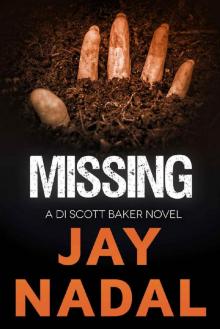 Missing
Missing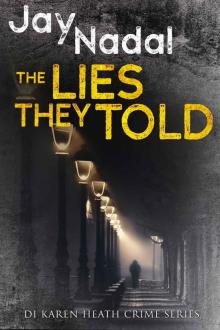 The Lies They Told
The Lies They Told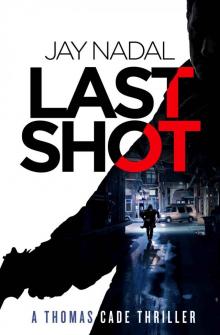 Last Shot
Last Shot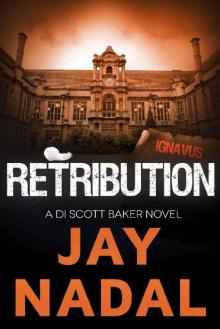 Retribution
Retribution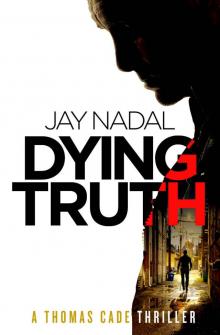 Dying Truth
Dying Truth Captive
Captive Isolation
Isolation Sacrifice
Sacrifice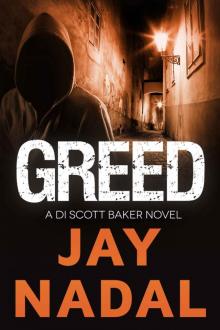 Greed: A DI Scott Baker Novel
Greed: A DI Scott Baker Novel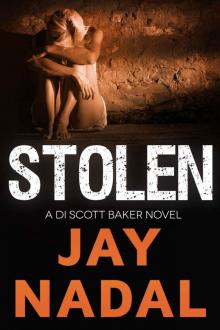 Stolen: A DI Scott Baker Novel
Stolen: A DI Scott Baker Novel